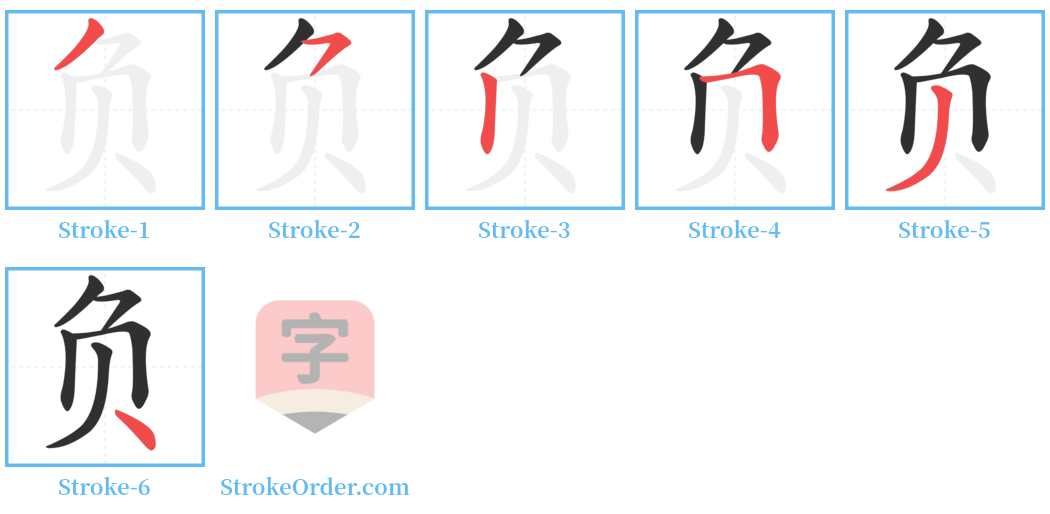负 Stroke Order
Animated Stroke Order of 负

Stroke Order Diagrams for 负

Step-by-Step Handwriting Guide for 负

Learn to Write Chinese Characters with Video Tutorials
Watch the video of writing the Chinese character "负", learn the correct stroke order (笔顺) of the character "负", and master the standard way of writing the character "负".
Free Printable Handwriting Practice with Stroke Order: 负
Printable Writing Practice Worksheet of "负" in Portrait Orientation (Tian Zi Ge)

Printable Writing Practice Worksheet of "负" in Landscape Orientation (Tian Zi Ge)

Information of 负
Pinyin
fù
Radical
贝
Strokes
6 strokes
Usage
★★★★★
Definition
lose / negative (math. etc.) / to bear / to carry (on one's back)
负 fù
【Verb】
1. To carry on the back; to shoulder (背, bèi): 例如:负米、负疚、负重、如释重负、负荆请罪。
[E.g., to carry grain on the back, to carry the burden of guilt, to carry a heavy load, to feel relieved after unloading a burden, to carry a stick and apologize.]
2. To assume responsibility (担任): 例如:担负、负责、负累、负罪、负荷、忍辱负重、身负重任。
[E.g., to bear a burden, to take responsibility, to carry weight, to bear guilt, to shoulder a load, to endure humiliation for a heavy responsibility, to be tasked with an important duty.]
3. To rely on; to depend on (仗恃,依靠): 例如:负隅顽抗、自负。
[E.g., to rely on one's defenses against adversaries, to be self-important.]
4. To suffer; to endure (遭受): 例如:负伤、负屈。
[E.g., to suffer injuries, to endure humiliation.]
5. To possess; to enjoy (具有,享有): 例如:久负盛誉。
[E.g., to have long enjoyed a great reputation.]
6. To owe (欠): 例如:负债。
[E.g., to be in debt.]
7. Less than zero; negative (小于零的): 例如:负数。
[E.g., a negative number.]
8. The opposite side of a relation; negative (与“正”相对): 例如:负电、负极。
[E.g., negative electricity, negative pole.]
9. To betray; to violate (违背,背弃): 例如:负心、负约、忘恩负义。
[E.g., to betray one's heart, to break a promise, to be ungrateful.]
10. To fail; to be defeated (失败): 例如:不分胜负。
[E.g., to not distinguish between victory and defeat.]
11. To suffer (蒙受): 例如:负屈、负讥、负谤、负霜、负忧。
[E.g., to bear grievances, to endure ridicule, to suffer slander, to be frostbitten, to endure worries.]
12. To add; to load (加): 例如:负装、负衔、负驮、负轭、负乘。
[E.g., to load, to harness, to carry loads, to hitch a cart, to carry a passenger.]
13. To disappoint; to be ungrateful (辜负): 例如:负国、负恩、负负、负咎。
[E.g., to betray the nation, to be ungrateful, to feel sorry, to bear blame.]
14. To compensate; to repay (通“赔”): 例如:负赔偿。
[E.g., to compensate for losses.]
15. To lose (失掉): 例如:负职、负声、负实、负期。
[E.g., to lose one's position, to lose the beauty of rhythm in a text, to be untrue, to fail to meet a deadline.]
【Adjective】
1. Less than zero (小于零的): 例如:负数。
[E.g., negative number.]
2. Electrically charged negatively (得到电子的): 例如:负电、负极、负高压。
[E.g., negative electricity, negative pole, negative high voltage.]
to forget favors and violate justice (idiom); ingratitude to a friend / to kick a benefactor in the teeth
responsible for its profit and losses (of organization) / financially autonomous / personal financial responsibility
Input Method for 负
Pinyin
fu4
Wubi
qmu
Cangjie
nbo
Zhengma
rlo
Four Corner
27802
Unicode
U+8d1f
Same Pronunciation Characters